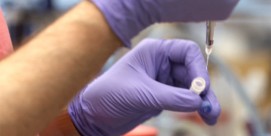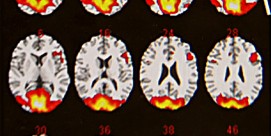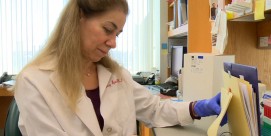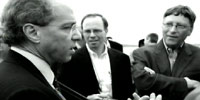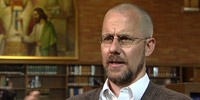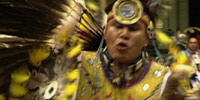In This Episode << SLIDE LEFT TO SEE ADDITIONAL SEGMENTS
President’s Council on Bioethics
Leon Kass
Chairman, President’s Council on Bioethics
On human cloning:
Human cloning is just one of a whole series of developments which will give this generation power over the genetic endowment of the next generation, and we ought to be thinking through the full import of starting down this road.
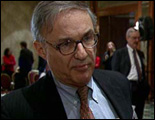
We are not going to be driven by the need to feed into the Senate’s discussion [of human cloning]. We’re going to try to do a good job rather than bend ourselves out of shape in the hope of influencing that debate. If the Senate would like to have testimony from members of the Council, we’re available. If they would like to see materials that we develop provisionally, we would make them available. As you can see from the briefing papers, we feel obliged to take up the question of the policy options and not just the ethical aspects of it. We will follow the timetable that the inquiry dictates. NBAC [President Clinton’s National Bioethics Advisory Commission] got 90 days for its cloning report. If we could do something useful sometime by the summer, we would have done something good. We are working this out as we go along. There isn’t a preset timetable for anything at the moment.
On reading Nathanial Hawthorne’s story “The Birthmark” with the Council:
It invites us to reflect deeply on the human aspiration to eliminate all defects from human life — the aspiration to perfection in whose service science has now been asked to lend a very large hand. It’s an old story, but now we’re really able to do something about it. It also invites one to think about — what’s a birthmark? What does it mean to be marked by being born? And whether that is an imperfection that science thinks it can do battle with. On the one hand, procreation mortality; on the other, the quest to produce human life under some ideal. How do you get people who have not met one another before to start talking together as human beings, not hiding behind their disciplinary boundaries? You give them a human story to which they cannot help but have a human reaction. If we’re lucky, this will not be an academic conversation. You won’t be able to tell who’s speaking, whether they’re lawyers or physicians it’s a non threatening way to get the conversation started on the really important subjects and on what the deep human questions are that are at stake here. And finally I would like to show that the resources available to us in thinking about these matters are not just to be found in the journal articles that people like me write. What’s relevant to doing bioethics properly is not just the literature of bioethicists like myself. We can get a lot of help from humanists, from religious thinkers, from philosophers, from political thinkers who have actually pondered some of these questions before. It’s not that we’re going to go to “The Birthmark” and somehow produce public policy out of it. That’s not the idea. But one might see more clearly what’s at stake here than one will if one is reading policy analysis.
On bioethics and ancient questions:
When you have the power to intervene in the human body and mind, not just to heal disease, which everybody wants to do, but to begin to make possible fundamental changes in human nature, you have to have a fairly good idea of what makes human life human and what it would mean to improve us. The ancient question of ethics is: What’s a good human life?
On public perceptions of bioethics:
The public really recognizes, it intuits somehow that what’s at stake in these questions really is the deep character of our humanity. And their fears and worries about it are not just owing to ignorance. Their concerns — they may not be able to express them very well, because they recognize that the project for the mastery of nature has now come home to work on the master himself and herself. That’s novel, and that means we ought to be thoughtful about what we’re trying to accomplish when we unleash these powers, and know how to regulate them to have their benefits without suffering the degradations.
On how the Torah guides thinking on bioethical issues:
I am not an expert. I am proudly Jewish, but my thoughts on this subject are not primarily Jewishly shaped.
Charles Krauthammer
Columnist, The Washington Post
On the most important issue confronting the Council:
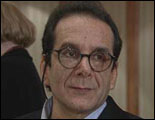
I think the real overlooked issue is not so much the origin of stem cells, for example, or cloned cells, but their destiny. What are they going to become? What kind of human hybrids, what kind of super-humans, what kind of sub-humans do we now have the power to make? It’s the first time in human history we’ve ever been on the threshold of really realizing kind of brave new world manufacture of human beings. I think whereas the debates have been mired on the question of where do the cells come from, when does life begin — I think those are important, but that is not the whole debate, and what this Council has to do is to make people understand that with the unbelievable technologies we now are about to manipulate, we’re going to have the power to create kinds of human life, maybe non-human life, that are quite monstrous — also to some extent, perhaps, promising. But that’s what these issues are really about. We have to face that. It’s not so much the origin of stem cells, but their destiny.
On the Council’s diversity:
On the issue of abortion I’m pro-choice. I believe in legalized abortion. I’ve written and I’ve said that. And yet I have grave concerns about what will be done with these cells, these new technologies. What are the possibilities for the kind of manufacture of human beings that are in our hands? I don’t think that the traditional categories (pro-choice/pro-life, liberal/conservative) are really going to be terribly applicable. I think only if you look at it through the crude lens of the abortion debates can you say, well, this may be conservative or liberal. We have new issues, new technologies, and new moral challenges on this commission, and I think we have an extremely thoughtful and very distinguished group of people who’ll bring an open mind. I think we are going to get very interesting results.
James Q. Wilson
Professor of Public Policy
Pepperdine University
On the issues before the Council:
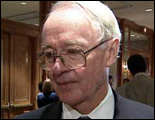
Right now I would say our most challenging problem will be therapeutic cloning — cloning not for the purpose of producing a child (my view is that’s bad), but rather for developing an embryo to the point where stem cells can be used to cure illnesses, and whether this does violence to one’s essential humanity or whether the overriding social benefit is larger. This is not a question that’s easily answered. My guess [is] this will be our most difficult problem.
Our mission is to tell the President of the United States what we think, and we may think it in two or three somewhat contradictory batches; I’m not sure whether we will come to agreement or not.
Dr. Daniel W. Foster
University of Texas Southwestern Medical School
On the Council’s meeting with President Bush at the White House:
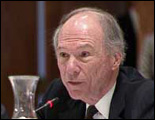
[The president] wants us to educate him and educate the people about the new bioscience. He asked a number of the members of the Council to make comments about what they thought. It was not just an ordinary conversation. I think serious things were pointed out — that this is very much on the public’s mind, that there are going to be different views, that there’s not going to be one answer. One of the things that was most impressive was that he said he wanted the Council to take all views. Even though he has publicly said that he is against cloning, he wants the Council to take all views. One of the scientists said, “Well, that’s what the scientists are here for, to inform you about those things.”
On human cloning:
Leon Kass has interpreted the president’s direction to say that the cloning issue is the one that we’re going to start with. He’s described it as a short-term issue, so I believe that we will try to deal with that before we deal with things like stem cell treatment of diseases and things of that sort.
The different views are all focusing on serious issues of what it means to be a human. I’m nervous about enhancement and the fairness of that — if only the rich can get a higher IQ, or something like that. Repairing defects and illness is different, in my mind, than enhancement. I believe in a meritocracy — the idea that all humans are deserving of respect, but not all are deserving of praise. If you clone everybody to be smart, then there’s no such thing as merit. There’s no fairness.
The cloning of a whole human being, like the cloning of a sheep, is a very different issue. The real issue for physicians is whether we can use gene therapy to repair sickle cell anemia, let’s say, or Parkinson’s disease. And even here we’ll discuss the difference between somatic gene therapy, that is, the repair of a single human by putting in a gene that they’re missing, as opposed to germ line gene therapy, because if you put it in the germ line then all the progeny will be well, but you’ve also got the dangers of mutations. I’m very comfortable with the idea of somatic gene therapy for individual illnesses. So the cloning is not going to be for the repair of diseases; it might be for a set of humans that don’t have any diseases if you want to do that.
On human imperfection and gene therapy:
As a physican-scientist, I’m all for trying to help humans who are sick. But I heard a minister speak once who had lost his nine-year-old daughter to acute leukemia, and he said, “If you ask me, would I rather not have had her born or had her for nine years, I would not trade the nine years that I had her with her imperfections.” None of the great things in humanity are available if there’s not risk. There’s no role for bravery if there’s not risk. There’s no role for compassion if there’s not suffering. A lot of what makes humans great comes out of these imperfections.
Francis Fukuyama
Professor of International Political Economy
Johns Hopkins University
On issues beyond human cloning:
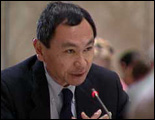
My basic concern is the longer term institutional one. I was in favor of the Weldon bill [Rep. Dave Weldon, R-Fla., sponsor of the House-passed legislation to ban human cloning], and I testified on that. But I think that this kind of legislative ban isn’t going to work in the future for a lot of the issues that have to be dealt with. To the extent that I think I can help as a political scientist, it’s in trying to understand what kind of an institutional structure would be capable of making the kind of decision that goes way beyond cloning. You’re going to have all sorts of issues coming up in the future: Should we allow parents to select enhancement characteristics in their children? Right now there’s no regulatory structure that will allow you to make that kind of a decision. The more important issues go beyond the immediate cloning thing.

